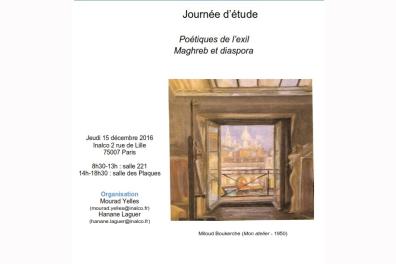Poetics of exile. Maghreb and diaspora, study day.

Proceedings of the Study Day "Poetics of exile. Maghreb and diaspora"
(INALCO - Thursday, December 15, 2016)
At the start of the day, the organizers did not fail to recall the increasingly important place of exile studies in current research in the humanities and social sciences and the importance of the comparative perspective. The theme of exile is also increasingly present in various artistic expressions: literature, theater, song, cinema, painting.
Exile is often considered from an etymological perspective that emphasizes the notion of exclusion. Indeed, the Latin ex-ilium cuts the victim off from his or her homeland, condemning him or her to banishment. In other words, exile is first and foremost synonymous with hardship and suffering. Those driven from their circle of acquaintances, from their native land, can only feel nostalgia and melancholy. Yet the socio-cultural reality is more complex. This is precisely what the speakers have shown, using a variety of corpuses and approaches.
As far as the Maghreb is concerned, this notion is certainly problematic insofar as the study of texts (novels, poems) reveals a number of different postures and imaginaries according to time, individuality and even language. It is therefore a decisive experience, but one that takes on multiple appearances and meanings: at once socio-historical determination, traumatic experience and fantastical imagination, fate and escape, movement and stasis. In any case, it is certain that in the artistic and poetic history of the Maghreb, the exilic experience is truly at the heart of contemporary creation.
In keeping with the rationale of this study day, the papers were organized around two main axes corresponding to the two major registers of literary expression, the novel and poetry. In order of presentation, we had the pleasure of listening to:
- Anas Alaili, Docteur en langue et littérature arabe, Responsable du fonds des langues sémitiques, Bibliothèque Université Paris 8, who spoke on "L'exil un lieu de passage : Littérature palestinienne contemporaine"
- Elisabeth Schulz, PhD and associate researcher at CERIEC (Université d'Angers), who focused on "L'exil, terreau de la littérature judéo-maghrébine francophone"
- Aïcha Aknazzay, PhD student at the University of Cergy-Pontoise, LDI-CNRS 7187 laboratory, who examined the meaning of exile in Moroccan writer Abdelkebir Khatibi ("Quel exil pour Khatibi, l'étranger professionnel?")
- Lynda-Nawel Tebbani, PhD student (Université de Lorraine), Member of Passages XX-XXI, Lyon 2 / Associate Member at Crasc - Uccla (Oran), who addressed the problematic of "The Poetics of Memory in Mourad Djebel's novel: Ex-il et Ex-je(s) ou la musicalité de la "double absence")
- Laguer Hanane, PhD student and researcher associated with Lacnad (Inalco), who spoke on "Les représentations de l'exil dans Les Balcons de la mer du nord (Waciny Laredj)"
- Abdelkader Al Andalussy Oukrid, Lecturer, Université Descartes - Paris, who chose to focus on "Exiles, nostalgic identifications and poetic interferences"
- Farida Aït-Ferroukh, Enseignante-chercheuse (Aix- Marseille I, Paris VIII) who presented a paper on the theme of "El-Hasnaoui, voix-relais. Paroles de femmes blessées"
- Damien Taillard, Director of the Phocéephone association, who explored "Sillons de Belsunce: pour une poétique de la chanson de l'exil"
- Sadek Sallam, Writer. Collection director (Editions Villeneuve), who examined the links between "Poetry and mysticism during Emir Abdelkader's exile in France (1847-1852)"
- Hervé Sanson, Senior Lecturer at the Institut de romanistique (Aachen), Associate Member at Thalim (CNRS/ENS/Paris 3) and ITEM (Institut textes et manuscrits) who reported on an artistic experience related to the day's theme: "Traverser de Habib Tengour: comment faire la traversée, du poème à l'adaptation scénique?"
- Tahar Bekri, Poet and Senior Lecturer at the University of Paris X-Nanterre, who spoke to us about his journey as an exiled writer in a contribution entitled "Écrire l'exil"
A round-table discussion (moderated by Mourad Yelles, with the participation of Tahar Bekri, Olivia Elias and Habib Tengour) brought this important event to a close. To sum up its general tone and (necessarily provisional) conclusions, it's probably best to quote three extracts from Tahar Bekri's speech. To begin with, the poet explains that "the theme of exile imposed itself on me in this need to express absence, lack, revolt, in a desire to surpass oneself, but above all in a desire to resist injustice, servitude, the will of the prince, writing I consider above all as is an act of freedom." Knowing that "Writing about exile is not just about looking at the country of origin in some kind of outrageous idealization; it is also about looking with gratitude at the host country, which allows you to maintain your dignity as an exile". Last but not least, the poet reminds us that, while "[...] a literary text is not unrelated to the context in which it is written, it remains to find a form, an aesthetic, a rhythm, a language - in short, a writing, a poetics". As in the case of all exiled writers, starting with Maghrebi writers, it is in this critical poetic and intellectual movement that, for Tahar Bekri, the very heart of the work of poetic creation lies.
Hanane Laguer, PhD student and associate researcher at Lacnad (Inalco)
Mourad Yelles, university professor of Maghreb and comparative literature at Inalco. Deputy director of Lacnad and head of the Cream component (Centre de recherche et d'études sur l'arabe maghrébin).